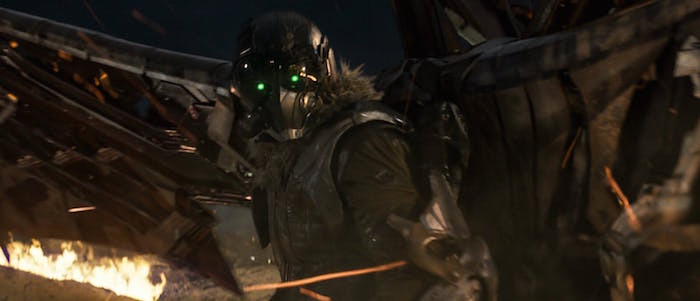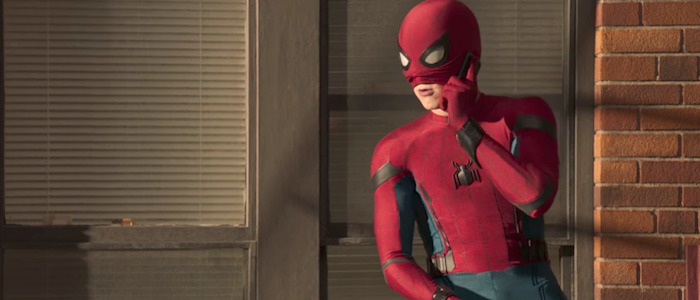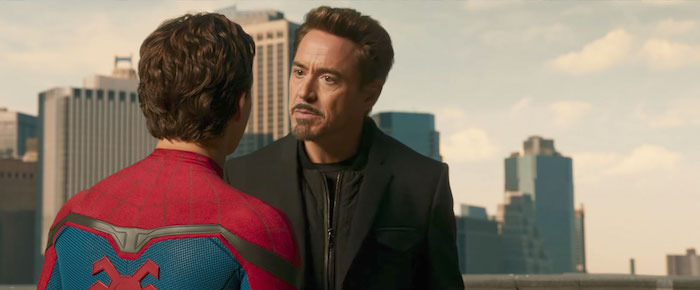'Spider-Man: Homecoming' Fleshes Out The Corners Of The MCU
(Welcome to Road to Infinity War, a new series where we revisit the first 18 movies of the Marvel Cinematic Universe and ask "How did we get here?" In this edition: Spider-Man: Homecoming offers a peek at the margins of the Marvel Cinematic Universe.)
The "Homecoming" sub-title has a sly double meaning in North America, but both the phrase and its many localizations – usually some variant of "Returning Home" – sent a singular message to most of the world. This was Spider-Man back where he belonged, at the House of Ideas, right alongside characters he'd shared the page with for over 50 years. In order to re-establish him though, Marvel needed to answer a key question following his appearance in Captain America: Civil War: Where does Spider-Man fit in a world of Avengers?
The Marvel Cinematic Universe had been around for nearly 10 years by the time we got Spider-Man: Homecoming. This fictional world began shortly after Tobey Maguire vacated the spider-suit, and it continued through Andrew Garfield fizzling out. Tom Holland was to be the third on-screen Spider-Man in under a decade, and separating him from the other two became imperative. In both prior incarnations, Spider-Man was the only hero around and he had to rise to the occasion no matter how big the threat. Holland's Peter Parker however – younger, smaller, and of meeker demeanor – exists in a world much like our own: a world where a kid his age had grown up watching Avengers rule the skies, as the little guys looked up in awe.
The Adjacent Avenger
With great power comes great responsibility. But what of someone with, say, medium power, in a world of Gods and monsters? For what, and to whom, is this Spider-Man responsible?
For better or for worse – arguably for both – Spider-Man: Homecoming is about establishing Peter Parker's place in the MCU. This goal drives both the narrative as well as the meta-narrative, with the audience wondering how this shiny new piece would fit the bigger puzzle. Peter wrestles with trying to be a hero in a world where heroism itself is changing, as the film fleshes out the margins of the Marvel world by providing a ground-up perspective. The film is unique in how small and intimate it feels (perhaps more so than Ant-Man, though its stakes are lower), and it has a distinct sense of time and place. This is a familiar New York City, from its diversity to the cats that frequent its corner bodegas.
But it's also a New York where bank robbers armed with alien tech run around in Avengers masks; a New York that's been altered by the events of preceding films.
We open with Adrian Toomes (Michael Keaton), a blue-collar contractor hired to clean up the mess made in (and by) The Avengers. However, Tony Stark's own "Damage Control" initiative, alongside the U.S. Government, steals Toomes' contract from under him. Toomes is one of the forgotten "little guys" in this story, though fast forward eight years and he's using his Vulture suit to steal scraps from the Avengers' battles. Like Tony Stark, he's an arms dealer, though only on a local level. And like Tony Stark, all he's doing is adapting to a changing world, even if it means stealing from the Avengers as their assistants and supporting characters transport their equipment. Toomes, like Peter (and like the film itself) exists in the Avengers' shadow. It's as if Homecoming is Marvel's first spin-off film.
This is a world where the likes of Howard Stark are immortalized on high-school walls, and one where Captain America makes state-mandated motivational videos for detention and gym class. It's also a world where Captain America is considered a war criminal, but nobody needs to deal with the events of Civil War directly. Nobody except Peter Parker, that is. The Sokovia Accords place Peter under the watchful eye of Tony Stark, and his street-level heroism is an avenue to impressing his way to Avenger status. Peter wants to be an Avenger. He wants the big battles and the dangerous criminals and all the things Marvel's known for, but Tony needs him to stay put.
The mechanics of Spider-Man: Homecoming itself are geared towards separating Spidey from the other Avengers. As much as the possibility exists for Spider-Man to fight alongside Stark and the other heavy hitter – and he will, once Infinity War rolls around – Spidey's status quo is established through his screw-ups. This world of superheroes and arms dealers is too big for him right now. His story is much more interesting when it pivots around high-school drama or saving a single life, especially the life of a villain.
By the end, Peter rejects becoming an Avenger in order to affirm his new normal, choosing instead to return to his world of realistic New York streets and to fight the smaller battles, interacting with the little guys in the margins. But does it really mean anything?
The Passive Peter Parker
Spider-Man: Homecoming is breezily paced. It's imbued with moment-to-moment joy, taking full advantage of director Jon Watts' penchant for crafting realistic child characters without being patronizing (his Cop Car is a must), but what is the film ultimately about outside of its own mechanics? Peter's choice to return to Queens isn't rooted in any discernible ethos.
When Peter screws up, biting off more than he can chew, his break from web-slinging is a necessary lull. It's an opportunity for him to reflect on those he's ignored in the process of chasing Avenging – a theme that's brought up once again by Liz as she leaves – and yet the film sees Peter going right back to fighting an enormous villain he was explicitly told not to, without any sort of reflection or learning being dramatized. That Peter succeeds in fighting The Vulture is great. That he saves the villain in the process is even better. But constructing the film this way leaves this coming-of-age story without any actual coming of age. It's clear from the Infinity War trailers that he's still ready to jump back into larger-than-life battle at a moment's notice. Which, again, is exactly what Spider-Man would do! But placing Spider-Man in a narrative where he has to both reject heroism and chase it with all his might is a have/eat cake scenario.
Whatever internal journey catalyzes Peter's Queens return – whether the realization that Avenging is all too much for him, or that he's hurt Liz by prioritizing his superheroics – isn't externalized. What's more, the language of the film actively subverts it. Peter has still saved the day by taking on The Vulture in mid-air. In the process, Liz (revealed to be Toomes' daughter) has been forced to leave New York. This is never treated as an outcome Peter wrestles with, let alone understands, but even if the onus is entirely on Toomes, the experience doesn't really impact who Peter is. He apologizes to Liz, vaguely, because he sees she's upset. There's no moment of guilt, or any beat of wanting to tell her his secret, or even a moment where he reconsiders his course of action.
When he's presented with his new outfit by Tony Stark, Peter rejecting becoming an Avengers arrives as a mere inevitability of the film's prior set up. Nothing leads him to turning down this new position, and nothing or no one in particular draws him back to Queens now that Liz is gone. He simply returns because that's where the franchise needs him to be, though the lip-service to looking after those on the ground is a nice enough sentiment.
Iron Man 4
Peter's moment of self-actualization arrives as he gets himself out from under debris. His own face reflected back to him in a puddle, half obscured by his mask. The two sides to Peter Parker. Now without his hi-tech suit, he has to rely on his strength, repeating "Come on, Spider-Man!" to himself as he recreates two iconic images from the comics. But while he gets the lifting part right, the reflection feels distinctly hollow. His show of strength is a payoff with no coherent set-up, though it's set against the echo of Tony Stark's words to Peter after he screwed up on the Staten Island Ferry:
"If you're nothing without this suit, you shouldn't have it."
This callback is unfortunately empty as it pertains to Peter, on both a literal and metaphorical level. Not only does he have a handy spider-suit on, he also hasn't had to wrestle with his duality or his reliance on heroic identity (if anything, he leans into it) but the reason the line sticks out in the broader Marvel narrative is because of what it means for Tony Stark.
In Iron Man 2, Tony famously told the senate committee "The suit and I are one." Since then, after having to prove his mettle in The Avengers and after shedding his addictive reliance on technology in Iron Man 3, Tony Stark has evolved from spoiled brat to the point of dolling out fatherly advice on superhero identity. The reset button had been pushed on his character enough times that once Avengers: Age of Ultron rolled around, repetitively seeking to correct past mistakes with new ones became part of his narrative fabric. Rather than going in circles, his long-term narrative trajectory took the form of an ascending spiral staircase.
After spending his first film appearance deciding whose hands were the wrong ones when it came to weaponry (and debating the right ones by punching his co-leader in the face), he spends his seventh starring role trying to return the world to a sense of normality. When alerted to an illegal weapons deal involving Chitauri technology, he alerts the FBI rather than intervening himself – that is, until absolutely necessary. Captain America: Civil War saw him finding renewed trust in the structures around him. In Spider-Man: Homecoming we get to see what Tony's day off looks like, as he deals with the minutae of the new status quo he helped usher in.
More so than just the structural normalcy though, we also get to see the ramifications of the Sokovia Accords in action vis-à-vis Spider-Man. Tony placing himself both under the law as well as in a position to uphold it means balancing and delegating responsibility. Not only is training new recruits his duty as the head of the remaining Avengers, but whatever mistakes they make are on him, especially if they die in the process. He can't afford to let Peter become another Charles Spencer, and doesn't return Peter's suit until he's proved himself.
In Captain America's absence, Tony Stark has finally stepped into the shoes of a leader. That's a big deal, and a huge step forward in the overall story – but Tony only appears in a handful of scenes. While Tom Holland's manic, vlogger energy and wide-innocence make sure he isn't overshadowed by Downey Jr., Spider-Man: Homecoming can't help but feel like a really good Tony Stark story nestled between in incomplete Spidey adventure. Though of course, it's an adventure that feels true to its setting in a way that most Marvel films don't.
Homecoming allows the seams of the Marvel Cinematic Universe to relax between bigger installments. It creates a living, breathing MCU that you could step right into, with people you could strike up a conversation with – about the weather, or about the latest Avengers mission seen on the news. We may not have a clear sense of how Peter Parker fits into his world – for my money, neither does he – but we now know exactly what that world feels like when the sky isn't falling.
And when the sky does fall in Avengers: Infinity War, we'll know what's at stake.



